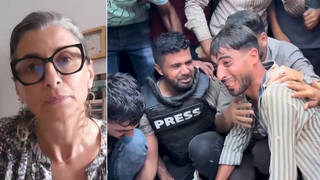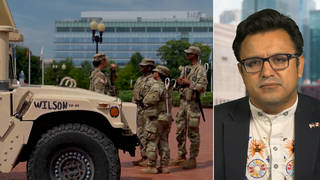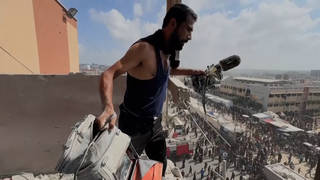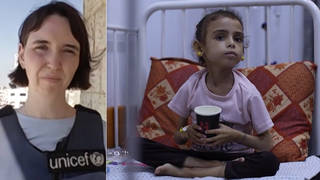
Topics
Students around the country have launched a national week of campus resistance to mark the second anniversary of the Iraq invasion and high profile counter-recruitment protests are being staged at university campuses around the country. We speak with a former marine and recruiter’s assistant who is now speaking out against the military and two people arrested during a protest against military recruiters on university campus. [includes rush transcript]
Students around the country have launched a national week of campus resistance to mark the second anniversary of the Iraq invasion.
In New York Wednesday the Hunter Campus Anti-war Network staged a protest at a career fair featuring military recruiters. At the University of Wisconsin in Madison, students protested against the ROTC’s presence on campus.
Last week high profile counter-recruitment protests were staged at City College in New York and San Francisco State University.
Today we are joined by three guests in our New York studio. Chris Dugan is a graduate student at Hunter College. He served in the Marine Corps from 1995 to 1999 and has worked as a recruiter assistant. He is now a member of the Campus Antiwar Network and has protested against recruiting on campus. Hadas Thier is a student at City College New York. She was arrested last week during a protest against military recruiters on campus. She was charged with assault and has been suspended from the University and banned form setting foot on campus. And Carol Lang, a City College staff member who was picked up in her office and arrested in connection with the protest and also charged with assault.
- Hadas Their
- Carol Lang
- Chris Dugan
Transcript
AMY GOODMAN: Today we’re joined by three guests here in our firehouse studio in New York. Chris Dugan is a graduate student at Hunter College. He served in the Marine Corps from 1995 to 1999 and has worked as a recruiter assistant. He is now a member of the campus anti-war network and has protested against recruiting on campus. Hadas Their is a student at City College here in New York. She was arrested last week during a protest against military recruiters on campus. She was charged with assault and has been suspended from the university and banned from setting foot on campus. Carol Lang, City College staff member, long-time secretary, was picked up in her office and arrested in connection with a protest. She was charged with assault, but she was picked up two days after the protest at her office. Well, why don’t we begin with Hadas. Why don’t you explain what happened at your protest and where it was? First, how old are you?
HADAS THEIR: I’m 28, in my last semester at City College. And basically what happened was a group of about 20 of us went to protest the military recruiters. They had four different branches set up at our career fair at City College. And the reason that we were there is that we felt like we needed to make our case that this was not a real job opportunity, that you know, the military recruiters set up at City College because, you know, it’s a working class school. It’s predominantly people of color, and they feel like they can target our community as people who might just be desperate enough, you know, to take this as a quote, unquote, “job opportunity,” you know, when it’s really about risking our lives, you know, for what I think is an unjust war, and one that was based on lies. And essentially, within, you know, moments of us arriving — and we just started chanting “Recruiters Off Our Campus, U.S. Out Of Iraq” — within moments, the security guards swooped in, pushed us out into the hallway, and in the hallway, we were —- several people were actually assaulted, and three of us -—
AMY GOODMAN: Assaulted by whom?
HADAS THEIR: By security. And then three of us were arrested and now — well, and then the fourth, obviously, Carol, two days later. And now three out of the four of us are actually charged with assault, despite the fact that we were peacefully protesting. We have tons of witnesses on the scene who know that we were just peacefully protesting, and it was actually security that was violent with us.
JUAN GONZALEZ: Now, City University has increasingly over the last decade or so developed a sort of a militarized force, and they also use some outside private contractors. Can you talk about that a little bit?
HADAS THEIR: Yeah. Actually they were private contractors on the scene, and they’re not — they weren’t supposed to be involved in handling us, and they were. The other thing that’s really kind of shocking to me, anyway, that I found out while all this ordeal was happening was that security forces at City College aren’t hired by the administration. They’re hired by the city, and they’re not actually accountable to even the administration, let alone the student body. So, essentially, we have this sort of occupying force in our own school. And they just went really ballistic on us. I mean, I think they were ready to go all out.
AMY GOODMAN: So you were arrested, and now you are banned from campus?
HADAS THEIR: Mm-hmm.
AMY GOODMAN: What happened?
HADAS THEIR: Well, the administration, within a day of our release from central booking, came out with its own statement. The president put out a statement to the entire faculty and student body.
AMY GOODMAN: The president is —
HADAS THEIR: Gregory Williams. And he sent out a statement stating as fact, basically, what the security officers were alleging, that hasn’t been proven in any court of law, and he just stated that, you know, we were violent, that we assaulted security, and then that day I received a phone call notifying me of my suspension without even having asked me or anyone on the scene for that matter, you know, what had happened. Not actually even wanting to hear our point of view. So, they lined up very squarely with security and the state right off the bat.
JUAN GONZALEZ: Well, it used to be on college campuses that before you could be suspended, you would have to have some kind of administrative hearing to judge whether you had done anything to violate university rules.
HADAS THEIR: Yeah. Well, they told me — I said, you know, “You realize that I’m entitled to due process at the university.” And they said, “Well, according to the bylaws, we can suspend you temporarily until your disciplinary hearings.”
AMY GOODMAN: And when are they set for?
HADAS THEIR: They’re set for probably early April. They were — they are obligated to give us a disciplinary hearing within seven business days, but we didn’t have our — they told us within a day, basically, they gave us 24 hours notice, so we didn’t have time to prepare our case, so we have it pushed back until early April.
AMY GOODMAN: Carol Lang, what happened to you?
CAROL LANG: Well, I was at the protest also, and pretty much what Hadas said was what happened. Within two minutes, security had pushed us out into the hallway, and then within the space of another two minutes, they had assaulted three of the students — or two of the students, and Hadas was also arrested for taking pictures of the assault. And then I got into a discussion with one of the administrators there saying, “What about our right to free speech?” And this vice president, whose name I have forgotten right now, said, “Well, that’s a question.” And I said, “Well that’s my question. What’s your answer? You’re the administrator. You’re supposed to be coming up with the policy.” And she said, “You were disruptive.” And I said we hadn’t prevented anybody from getting to any of the tables. We just stood there and shouted “U.S. Out Of Iraq! Recruiters Off Campus!” And then I went to work. I had asked her again about free speech, and she responded in the same way. “That’s a question.” And I said, well — and, this is on tape — because one of the film students happened to be in the area, and he filmed it, and he was also harassed by the administration. Had he not stopped, something — he might have been expelled also from the school. So they actually charged me with fleeing the scene, when in fact I had this long discussion with this vice president after the whole thing happened, and then two days later, four — they’re called peace officers, and they actually work for the police department, and they are stationed at the different, you know, segments of the City University —- they came into my office and said I was going to security and I said -—
AMY GOODMAN: You were at your desk?
CAROL LANG: I was at my desk. This was 12:00 in the afternoon.
AMY GOODMAN: How long you have been a secretary?
CAROL LANG: 30 years, and nothing has ever — I generally join in protests, but…
AMY GOODMAN: How often do you get arrested?
CAROL LANG: This is the first time. Williams has decided —- Williams used to be a Deputy Sheriff when he lived in the Midwest somewhere, and -—
AMY GOODMAN: The president.
CAROL LANG: Yes. And he has decided — after 9/11 happened, he put up signs all over the place saying, “United We Stand.” So, he is taking homeland security to heart and bringing it to City College. Every time something happens there, he immediately calls the police. And historically, except for early on in the 1930s and the 1940s, the police have not generally been called. It’s sort of unstated that cops just don’t come on campus, but Williams has basically decided that he wants to militarize the school and has decided that no matter what the opportunity, he’s going to call them on campus. So, four police came to my office, and when I got on Amsterdam Avenue, because my office is on 140th Street and Amsterdam Avenue, they said I wasn’t going to security. They handcuffed me, put me in a cop car and took me to the 26th precinct. And my lawyer came down, and I said to the cops, “Is my lawyer there?” And they said, “No.” And they told my lawyer that I didn’t want a lawyer and that I said that he should go home. And so, this was all — it got worse as I went down to central booking. All of the police decided that they were going to lie, and they said that I was unwilling to be fingerprinted. And that was why they weren’t letting me out of jail, when in fact I had been fingerprinted three times. And I’m not about to tell somebody with a gun that I’m not going to be fingerprinted. So, they had to after 30 hours let me go, but the whole thing was orchestrated, I believe, by CUNY administration and with Williams at the head of this.
AMY GOODMAN: I have to say, we called City College to ask them to join us. They declined. We also called the recruiting centers for the Army Reserve, for the National Guard, for the Marine Corps. We also called the Pentagon. In some cases, didn’t get return calls; in other cases, were told that they would not come on. Juan.
JUAN GONZALEZ: In terms of — now, you as an employee, what happened to you? Were you also suspended from work?
CAROL LANG: Well, I was not only suspended, but I was suspended without pay for 30 days. Or until — after 30 days, they either have to make some decision or put me back. I have to have a step one hearing and step two hearing, but they can wait for 30 days. They can do it in a week; they can do it whenever they want to. But I have been essentially convicted, even before I had my day in court.
JUAN GONZALEZ: But, my understanding is, at least in the universities and the public school systems, if you are a teacher or a faculty member accused of child abuse or assault, you get suspended with pay.
CAROL LANG: If you’re a faculty member.
JUAN GONZALEZ: Right, if you’re a faculty member.
CAROL LANG: But not if you’re just a worker there.
JUAN GONZALEZ: But just a worker there, they can — automatic suspension without pay.
CAROL LANG: Right. So here we’re making a third of the salary, and I’m not begrudging anybody, but obviously this is a tremendous punishment to people in my category, because we don’t make a lot of money. My lawyer basically said that this is retaliation, and I think that suspending me is retaliation, as well.
AMY GOODMAN: We’re talking to Carol Lang, Hadas Their, and Chris Dugan. Chris, you were a military recruiter. Now you’re protesting military recruitment on campus. Talk about when you were in the military.
CHRIS DUGAN: Like you said, I was in from 1995 to 1999. I was very lucky, I wasn’t in during a time of war. But I was sort of gung ho. I wanted to do the best I could. I obtained the rank of sergeant while I was in. And the way I obtained that rank was by recruiting someone into the Marines, and you get points. They have quota systems. And by getting that one guy to join the Marines, it helped me to get promoted to sergeant. So now, I mean, my conscience got to me. Also, I’m just opposed to American imperialism in this war. And I want it to end. From my experience in the military, how they dehumanize you, how they desensitize you, they make your enemy look like an object. They make human beings look like objects. And I’m opposed to that.
JUAN GONZALEZ: Can you talk about that a little bit? The Marines, obviously, are the most elite of the American armed forces. In terms of how you reached your conclusions, did you have your political views before you joined the Marines, or did they develop during that time?
CHRIS DUGAN: I did. I mean, I had visited Ireland, the occupied six counties of Northern Ireland before I went into the Marines, and I saw the occupation there, but I was constantly rationalizing. “Ok, at least I have a future. I’m going to be getting a paycheck the 1st and 15th of every month. Let me just put this aside, do my four years, get out and then I won’t have to worry about it.” But just — I read A People’s History by Howard Zinn. I was a history buff. They were telling me about how we freed the Philippines and how we’re peacekeepers. And I was just like, this is the same things that they told the British soldiers when they were occupying Ireland, India and all around the world. So I started drawing the parallels, and from that I came to the conclusion that we were wrong, that I was wrong.
AMY GOODMAN: Can you talk about how you were taught to recruit, and what you do? What are your tactics?
CHRIS DUGAN: Actually, I didn’t go to the school where — recruiters would go to a school. I was a recruiter’s assistant. So, they would just tell me, you know, spots to go. This is the best —- you go to restaurants, malls during the day, where people are just walking around, working class kids, high schools. What I would say is, basically, I would ask them a question, and then from that question -—
AMY GOODMAN: Would you be wearing a uniform?
CHRIS DUGAN: Yes. Absolutely. And from that question, I would feed off them and pitch them sort of like, to what they wanted. So, like they would ask me — like I’d say, “Are you interested in the Marines?” “Well, I don’t know. I sort of need college money, but I don’t know.” “Well, the Marine Corps can do a lot for you. Look at me. They took me, and they made me a disciplined person. That’s getting a college education. I have already gotten 30 credits in school. I’m doing really well.” You know, I would block everything else out that was going on in my life and just focus in on the positive, and I would relate it to their lives. I’d ask them about them: “How are you doing in school?” I’d seem very concerned. When really all I was worried about — and I like to think that most people — well, not like to think, but — a lot of the recruiters are worried about that bonus, they’re worried about those points. And it’s a career move. It helps them in their career to be a recruiter.
JUAN GONZALEZ: Now even the Marines in the last few months, for the first time in their history, have had difficulty meeting their quota, in terms of a recruitment quota.
CHRIS DUGAN: Yeah. That’s right.
JUAN GONZALEZ: What is your sense of what’s going on among young people in this country now, as they’re continuing to see the reality of the Iraq war and how they’re reacting to the pitches of the military?
CHRIS DUGAN: Well, I think that, I mean, it debunks that whole patriotism myth. I mean, that — I mean, I joined up for certain, I guess, somewhat patriotic ideologies a little bit. You know, I watched too many war movies as a kid. But I think that they’re seeing — I mean, on like shows like this and other independent media sources, they’re seeing the actual effects of war, and what’s going on. And I don’t think that — I mean, like I said, dying in Iraq is not a career opportunity. I don’t think that these people want to shoot other or kill other working class people in another country that have never done anything to them. It doesn’t make any sense.
AMY GOODMAN: We’re talking to Chris Dugan, who was an assistant recruiter, was in the Marines; Hadas Their, a student who was arrested this week, now banned from campus as she protested recruiting on her campus at City College; and Carol Lang, a 30-year secretary at City College who was also arrested two days after the protest.
[break]
AMY GOODMAN: Our guests are, well, a former assistant recruiter in the Marines from '95 to ’99, Chris Dugan; Hadas Their is with us, she's a student at City College, now she’s banned from her own campus because she participated in a counter-recruitment protest this week; and Carol Lang, long time secretary at City College, also arrested. Though she was at the protest, she was arrested two days later, suspended without pay, as we talk on this eve of the second anniversary of the invasion. Yesterday on NPR’s “Morning Edition,” they were talking about the recruiting woes at the National Guard. NPR tracked down one recruiter working at Bell High School in southeast Los Angeles. As part of her pitch to students, the recruiter claimed there is a greater chance of being killed in their own neighborhood than in Iraq. The reporter says this recruiter has little patience with parental fears that their kids might get wounded or killed. She thinks there’s a better chance of being killed in LA than in Iraq. And the recruiter says, because they might get killed when they step outside the door — they can get shot — you might as well get shot for freedom, for a purpose. Your response, Chris Dugan?
CHRIS DUGAN: I think it’s sad. I think, why don’t we address that concern about the communities: people being shot by cops, gangs? Why don’t we — where is the money going towards that, rather than going and killing other people in Iraq? And I heard this a lot. I mean, I remember a corporal in the Marines asked me and another marine, asked me, why did I join? I said, “A sort of patriotism. I wasn’t sure what to do.” He said, you know, “Yeah, whatever.” He asked the other guy, “Why did you join?” It was an African American gentleman from Chicago, the inner city. And he said, “Because I was going to get shot at home. And that’s why I joined. I might as well make some money.” But it wasn’t for this freedom mentality. It was because he was afraid of getting shot at home. I mean, there wasn’t a war going on at the time.
AMY GOODMAN: What about this idea that you can get out? Often —- in the week we’ve been looking at this eve of the invasion -—
CHRIS DUGAN: Right.
AMY GOODMAN: Yesterday our producer went over to one of the recruitment stations, and he was told, if you want to — if you want to get out of the Navy, he said, “If you don’t want the Navy, the Navy doesn’t want you.”
CHRIS DUGAN: I heard that all the time. I went to the recruiting station also, and he said the exact same thing to me. And it’s amazing. They make it seem like it’s like, “Well, you can get out.” Exactly. The whole time it’s like, “We don’t want people in there who don’t want to be in. It doesn’t benefit us.” Well, I knew a lot of guys who wanted to get out, especially with the anthrax shots. People were scared about the anthrax shots, and they would not let them out. When I was in Okinawa, when I occupied Okinawa in Japan, the Marines all the time are saying, “I don’t want to get these anthrax shots.” And they were like, “You’re not getting out, and you’re getting an anthrax shot. And if you refuse, then we’re discharging you.” And it’s not an honorable discharge that they discharge you under.
JUAN GONZALEZ: Now, Hadas, I’d like to ask you, in terms of this whole effort at protesting the recruiters, what do you think is the impact in terms of the other students? Why do you do it? And what is the role of these recruiters on campus other than just — do they just man tables there, attempting to grab students who are passing by their tables, or are they more active throughout the campus?
HADAS THEIR: Well, they mostly just man tables. I think that there’s been a more and more aggressive policy. I know that they’ve taken over certain high schools and middle schools. There’s even a military middle school right now in Harlem. And essentially, they prey — they prey on us and our brothers and sisters. And they prey on people’s worst fears, and like that quote, you know, is just disgusting, “Well, you know you’re just going to get shot in your own community.” Just preying on people’s worst fears and conditions and things like that. I think the effect of counter-recruitment work has been great. And I think that that’s actually why they were prepared for us, and why they crack down on us in the way that they have. You know, I think you mentioned earlier in the show that recruitment numbers are down. I heard a Reuters report recently that that said that the Army was down 6% in terms of reaching its targeted goal, the Reserves 10%, and the National Guard 26%. I don’t think that’s because of just counter-recruitment activism. I think that that’s because of, you know, massive disaffection with the war and not wanting to get killed or kill for no weapons of mass destruction and all the lies and the rest of it. But I think that counter-recruitment has helped on that. It’s helped to tap into what I think is a very wide, wide disaffection. And the reason that we were out there is we wanted to give some voice to that and give some confidence to what is a growing sentiment on campuses.
AMY GOODMAN: How big is this campus recruitment protest movement around the country?
HADAS THEIR: I think it’s gotten to be quite massive in a very short amount of time. I think it’s been a fairly spontaneous outpouring. I think you mentioned that San Francisco State University, the day before we got arrested, they had at their career fair, 200 protesters that — at their career fair, because there were so many of them, managed to have a sit-in and had a teach-in for a couple of hours. [They] took over their career fair, which is fabulous. The next day, a couple of them came back, you know, to hand out leaflets, and they were handled in a similar way that we were at City College. But this is something that’s been growing. And I think, you know, for the first couple of weeks, you know, it caught administrations and recruiters unawares, and you know, last semester at City College, we actually managed to shut down our recruiters twice in a row. But I think that now they’re not so unaware, and they’re trying to formulate their response, because they need us. They cannot fight this war without us.
AMY GOODMAN: I wanted to ask Chris Dugan, the Indianapolis Star recently reported at least six recruiters have been charged with sexually assaulting young recruits in the past few years. In Indiana, a National Guardsman named Eric Vetesy was charged earlier this month with sexually assaulting six young women. They were mostly high school students. He faces 31 counts of rape, sexual battery, official misconduct, corrupt business influence. Prosecutors say he assembled background information on each recruit and was able to target those he thought most likely could be coerced. He went after high school students during lunch breaks at school. The local prosecutor said, “These were very young women who were being recruited out of high school classes. This is one of the most heinous investigations of this type I have seen and one of the worst abuses of authority.” Now, he had personal information about them. Is this the information that the schools hand over to the Pentagon?
CHRIS DUGAN: I would think — I mean, I don’t know personally, but I would think so. I mean, that’s how he gets their names. That’s how he compiles the data on them, and then he probably again manipulates them through that information. “Oh, my cousin was from the same town you’re from.” Things like that. Just to relate to the people like you’re their friend. The family. That’s the whole idea of the pulley program, the delayed entry program. They bring you in, and they make you feel, before you go to boot camp, that you’re part of a unit. That you’re part of something greater than just society. And it’s a testament to the dehumanizing factor that I mentioned earlier. My recruiter, the guy who recruited me, he was having sexual relations with a recruit. He also touched a teacher in the high school, which — he wasn’t allowed back in my high school. He wasn’t allowed back in. I mean, it’s rampant in the military.
AMY GOODMAN: Well, on that note, I want to thank you all for being with us, Chris Dugan and Hadas Their and Carol Lang.












Media Options